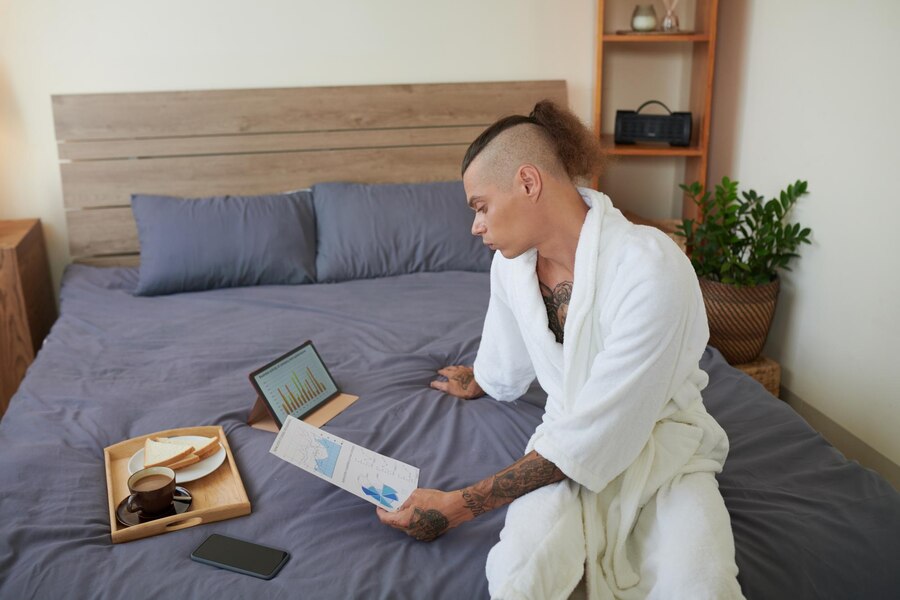Quality sleep is vital for overall health, particularly as we age. However, many seniors face sleep challenges that can lead to fatigue and decreased well-being. Implementing a simple bedtime routine can greatly enhance sleep quality, leading to better rest and improved health.
In this post, you’ll discover straightforward tips designed to improve sleep hygiene for older adults. From creating a calming environment to establishing consistent bedtime habits, these easy-to-follow strategies can help you wind down effectively. Whether you’ve tried various solutions or are just beginning to explore ways to improve your sleep, these practical approaches can guide you toward the rest you deserve. Small changes can lead to a more restful night and a brighter morning.
Understanding Sleep Hygiene
Sleep hygiene refers to a set of practices and habits essential for promoting quality sleep. Just as physical hygiene prevents illnesses, sleep hygiene is crucial for maintaining healthy sleep patterns. It encompasses everything from the environment in which you sleep to the routines you follow before bedtime.
What is Sleep Hygiene?
At its core, sleep hygiene includes various factors that influence how well you sleep. It’s more than just going to bed early. Key components include:
- Consistent Sleep Schedule: Regulating your body’s internal clock by going to bed and waking up at the same time each day can make falling asleep and waking up easier.
- Comfortable Sleep Environment: A cool, dark, and quiet bedroom, along with a comfortable mattress and pillows, are essential for quality sleep.
- Limiting Stimulants: Avoiding coffee, tea, and other stimulants in the hours leading up to bedtime helps your mind wind down.
- Relaxation Techniques: Activities like reading, practicing deep breathing, or listening to calming music signal your body that it’s time to sleep.
- Avoiding Screens: The blue light emitted by smartphones, tablets, and TVs can interfere with your ability to fall asleep. Aim to turn off these devices at least an hour before bedtime.
For seniors, who may experience changes in sleep patterns, establishing good sleep hygiene is especially important.
The Importance of Sleep Hygiene for Seniors
Good sleep hygiene is particularly crucial for older adults who often face various health challenges. Quality sleep greatly impacts overall health and well-being. Here’s why:
- Enhances Mental Health: Poor sleep can lead to cognitive decline, irritability, and even depression. Practicing good sleep hygiene can improve mental clarity and mood.
- Supports Physical Health: Quality sleep strengthens the immune system and helps manage chronic conditions like diabetes and heart disease.
- Improves Daily Functioning: A good night’s sleep enhances alertness and concentration during the day, allowing seniors to participate more fully in activities they enjoy.
- Promotes Safety: Better sleep helps prevent falls and accidents that may occur due to fatigue or disorientation.
Incorporating good sleep hygiene practices isn’t just about sleeping better; it’s about improving overall quality of life. With a bit of effort and consistency, seniors can enjoy more restful nights and brighter days.
Creating a Simple Bedtime Routine
A consistent bedtime routine can make a significant difference in how well seniors sleep. By setting up a simple routine, you can signal to your body that it’s time to wind down. Consider these key elements when creating an effective bedtime routine.
Setting a Consistent Sleep Schedule
One of the best ways to improve sleep is by maintaining a consistent sleep schedule. Going to bed and waking up at the same time daily helps regulate your body’s internal clock.
Winding Down: Activities to Incorporate
Calming activities before bedtime can reinforce your sleep routine. Consider reading, listening to music, gentle yoga, or meditation as part of your routine. Combining these activities can create a soothing pre-sleep ritual.
Creating a Restful Sleep Environment
Your bedroom environment plays a crucial role in how well you sleep. Ensure your space is dark, cool, and quiet, with comfortable bedding that supports your sleeping style. Removing distractions like TVs or computers can further enhance your sleep environment.
Lifestyle Tips for Better Sleep Hygiene
In addition to a good bedtime routine, simple lifestyle adjustments can make a big difference in sleep quality. Here are some tips to foster better sleep hygiene:
- Dietary Considerations: Foods rich in tryptophan, such as turkey and bananas, can promote sleep. Avoid heavy meals close to bedtime, and limit caffeine and alcohol intake.
- Managing Stress and Anxiety: Techniques like meditation, deep breathing exercises, and gratitude journaling can help calm the mind and prepare for sleep.
- Limiting Screen Time: Establish a screen curfew and consider relaxing activities like reading or listening to music instead. If you must use screens, enable night mode to reduce blue light exposure.
Conclusion
Establishing a simple bedtime routine can significantly enhance sleep quality for seniors. By maintaining a consistent sleep schedule, creating a calming environment, and engaging in relaxing activities before bed, you can set the stage for a restful night.
Ready to make a change? Start by introducing one new habit at a time. For more personalized tips and sleep solutions, visit Fix My Sleep. Your journey to better sleep begins now.







